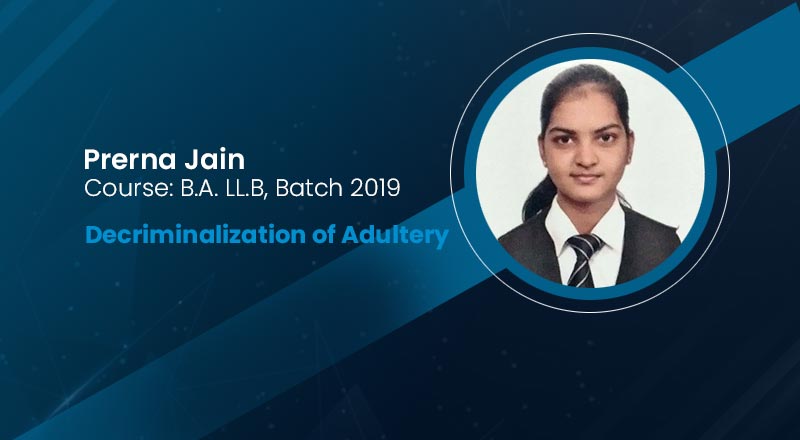Definition of Adultery:
“Adultery” gets its starting point from the French word ‘avoutre’, which has advanced from the Latin action word ‘adulterium’ signifies ‘to corrupt’. The dictionary meaning of adultery is that a married man commits adultery on the off chance that he has intercourse with a lady with whom he has not gone into wedlock.
According to Black’s Law Dictionary “Voluntary sexual intercourse of a married person with a person other than the offender’s husband or wife, or by a person with a person who is married to another”
Concise Oxford Dictionary – “voluntary sexual intercourse of married person with a person other than his spouse”
Legal Provision of Adultery
Section 497, Indian Penal Code: “Whoever has sex with an individual who is and whom he knows or has motivation to accept to be the spouse of another man, without the assent or intrigue of that man; such sex not adding up to the offense of assault, is liable of the offense of adultery. As Section 497 of Indian Penal Code considers adultery as an offence also provides punishment with imprisonment of either description for a term which may extend to 5 years, or with fine, or with both.
Following conditions must fulfill for adultery
- Sexual intercourse between a man and wife of another person.
- The man should know or should have the reason to believe that the woman is the wife of another person.
- It should not amount to the offence of rape means the act is done with the consent of the woman.
- It must take place without the consent of the husband of the woman.
Who is liable?
As per section 497, IPC, adultery is an offence when a man had sexual intercourse with a married woman without the consent of her husband. Only the man involved in adultery is liable for the offence. The woman involved in the act is not liable, even not as an abettor of the offence. Section 497, IPC clearly says “in such case the wife shall not be punished as an abettor”.
Aggrieved person
Section 198(2), Cr.PCconsiders the husband of the woman as an aggrieved party of the offence committed under Section 497 IPC, provided that in the absence of husband, some person who had care of the woman on his behalf at the time when such offence was committed, with the permission of the court, can complaint on his behalf. The sections do notconsider the wife of the adulterer as an aggrieved person.
Nature of the offence
The offence of adultery was an:
Non-cognizable offence – the accused cannot be arrested without an arrest warrant.
Bailable offence – the offences in which bail can be granted to the accused.
Compoundable offence – the court can record a compromise between the parties and drop charges against the accused. [Section 320 CrPC].
Recent Development
Joseph Shine v. Union of India, 2018 a public interest litigation was filedunderArticle 32of the Constitution, on October 2017 by Joseph Shine, a non-resident Keralite. The petition challenged the constitutional validity of the offence of adultery under Section497of the IPC read with Section198(2)of the CrPC being violative of article 14, 15 and 21. The petition claimed that the provision is discriminatory on the basis of gender and against the dignity of a woman.
The apex court held that:
- The wife of the man involved in adultery, unlike the husband of the woman involved, have no right to prosecute her husband for the offence. The husband of the adulterous woman is only considered as an aggrieved party, not the wife of the adulterous man. Hence section 497, IPC and section 198(2), CrPC violates article 14 and 15(1) of the Indian constitution.
- Article 15(3) of the Indian constitution enables the state to make beneficiary legislations for women and children. But section 497 under which an act is done between and with the consent of two adults. Such a provision cannot be considered as a beneficiary provision covered under article 15(3) of the Indian constitution.
- Section 497 violates the dignity of the woman contained in article 21 of the constitution of India. Section 497 permits such act if the husband of the woman gives his consent to the act and thus treating the woman as a mere property of her husband.
- legality, which postulates the existence of law;
- Need, defined in terms of a legitimate State interest, and
- Proportionality, which ensures a rational nexus between the object and the means adopted.
Section 497 fails to meet this three-fold requirement.
- Adultery should not be treated as a crime as it is a private wrong and so left as a ground for divorce.
- The Roman maxim cessante ratione legis, cessat ipsa lexmeaning when the reason of the law ceases, the law itself also ceases fits section 497 as the section has outlived its purpose. It is the solemn duty of the Supreme Court to cease such law and not to wait for the legislation.
Conclusion:
- The Supreme Court’s decision is concluded here with the following points:
- Section 497 is declared as unconstitutional on the ground that it violates article 14, 15, and 21 of the Indian constitution.
- Section 198(2) of the CrPC. which contains the procedure for prosecution under Chapter XX of the I.P.C. shall be unconstitutional only to the extent that it is applicable to the offense of Adultery under Section 497.
Thus, decriminalizes adultery.
The apex court overruled its judgment given in:
- Yusuf Abdul Aziz vs. The State Of Bombay
- Sowmithri Vishnu vs. Union Of India & Anr
- Revathi vs. Union Of India & Ors
Prerna Jain


